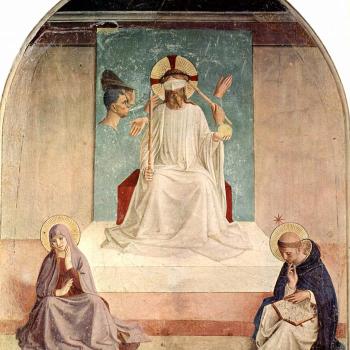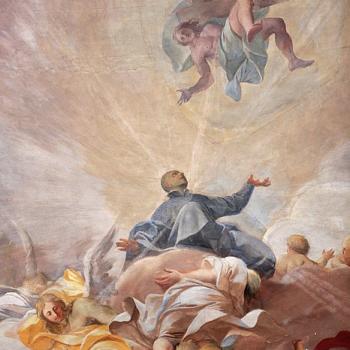 This week Taylor Marshall posted an article encouraging Catholics from refraining from attending Christian Seder meals. I am planning on attending a Seder this week so I took notice. I have been going to Christian Seder meals my whole life, even before I was Catholic, and they have formed my understanding of the sacrifice of Christ in deeply profound ways. I wanted to give Dr. Marshall a hearing so I read through the article. Although I deeply respect the perspective of Dr. Marshall I found that in the end I disagreed with his assessment of the practice. I thought I would share my reasons why here as a kind of alternative perspective. Dr. Marshall’s argument boils down to a few points. I wanted to address each of his points and then give you my own perspective on them . You can read his article here.
This week Taylor Marshall posted an article encouraging Catholics from refraining from attending Christian Seder meals. I am planning on attending a Seder this week so I took notice. I have been going to Christian Seder meals my whole life, even before I was Catholic, and they have formed my understanding of the sacrifice of Christ in deeply profound ways. I wanted to give Dr. Marshall a hearing so I read through the article. Although I deeply respect the perspective of Dr. Marshall I found that in the end I disagreed with his assessment of the practice. I thought I would share my reasons why here as a kind of alternative perspective. Dr. Marshall’s argument boils down to a few points. I wanted to address each of his points and then give you my own perspective on them . You can read his article here.
1. Dr. Marshall reminds us the Passover was intended to be an animal sacrifice originally, and we aren’t supposed to do that now that we have Jesus.
This is a valid point, but I think it might be a bit too simplistic of an evaluation. The Christian faith is one that is deeply rooted in the Jewish rites. We have to remember that the Apostles continued to go to the Temple and worship until it was destroyed, as well as gathering to “break bread” (Acts 2:46; 3:1-10; 5:42). While it is impossible to tell exactly how they understood the sacrificial system in these times of prayer, it is clear that they didn’t see any conflict with the new reality of life in Christ and the life of worship in the Jewish community. The foundation upon which the prayers of the Mass and the liturgy of the hours are built are rooted in the Jewish prayer they evolved out of. When Christ came he did not overturn the law, he fulfilled it. All Christian worship is based on developing the rites and prayer of Israel in light of the life, death, and resurrection of the Messiah, Jesus. This is true of the understanding of the Passover. We no longer must sacrifice a lamb each year, but that does not mean we must also jettison the practice altogether. We simply have a context of fulfilment that we are able to operate out of when we do it.
2. Dr. Marshall argues that the Epistle to the Hebrews equates Christians returning to the ceremonial laws of Moses as tantamount to denying Jesus Christ.
When reading the Epistles context is key. These are letters written to particular people with particular issues. To separate the teaching in these books from their historical context is dangerous. The book of Hebrews is addressing people who are tempted to return to their Jewish faith. It is all about using the types and figures of the Hebrew Bible to demonstrate how Christ is superior and should not be abandoned for lesser forms. The Christian Seder does not seek to abandon the faith, the mass or the sacraments but to help the faithful to engage more meaningfully in them through a deeper engagement in their roots and foundations. To apply what the author warns about in the Epistle to what faithful Catholics are doing in their practice of a Christian Seder is an abuse of the text.
3. Dr. Marshall reminds us that Saint Thomas Aquinas explains that the baptized Christian observing any Old Testament ritual, sacrament, or liturgy is sinning and if done with knowledge and full consent, such an act would be a “mortal sin.”
Although Dr. Marshall knows Aquinas much better than I do, I have to bring up that the reason Aquinas argues against Old Testament rituals is because he warns they imply that the ceremonial and sacrificial work of Christ did not happen. I’ll concede that to celebrate the Passover as a new sacrifice, or without reference to Christ could be potentially problematic. This is, however, not what is going on in a Christian Seder meal. These are intensely Christological events. They are about how what God was doing in a limited way for the people of Israel in the Passover finds its culmination and fulfilment for all people in the Pascal Mystery of Christ. If we were to ban any celebration that found its roots in Old Testament ritual we would have to also dispense with the Mass, Baptism, Anointing of the Sick, Ordination, and the Liturgy of the Hours.
4. Dr. Marshall argues the Christian Seder disrespects the Jewish liturgical celebration.
Christianity is a Jewish sect that evolved out of the Judaism of first century Palestine. Contemporary Judaism is also a sect that evolved out of first century Palestine. It was the sect which evolved out of the Pharisee movement. Out of the broad diversity of Jewish sects Christianity and Phariseeism are the only 2 who have survived the destruction of the Temple. Both of these sects have evolved their rites and practices over the past 2000 years based on their own theological affirmations. Neither of them have a monopoly on the sacred record of God’s relationship with his people in the Old Testament. Although Christians have to be careful that they are not practicing a form of ritual imperialism, the Passover is a sacred event for us as well. It is one of the primary lenses through which we understand the mystery of Christ and helps to inform our life. Taking time to pray and reflect through this powerful sign of God’s provision and promise helps is a rich source of life.
This point is the best of the bunch IMO and is one that has given me pause. I talked it over with one of my close Orthodox Jewish friends. He said that although it bothers him, he is also bothered by many of the ways other Jewish sects celebrated it. It highlighted for me how Passover is a shared sacred space. We have to approach it for respect for the traditions we share it with, but with an understanding that we will never be able to see it with the same eyes.
In closing – A few of my own thoughts
Although I agree with the core conviction of Dr. Marshall that the mass is the primary place where we should go to encounter the fulfillment of the Passover meal, I can’t help but feel that his discouragement of Catholics from celebrating a Seder meal is inappropriate. The Mass is the source and Summit of our Christian life, but we are encouraged to deepen our participation in the mass through personal devotions. Sacrosanctum Concilium teaches that “Popular devotions of the Christian people are to be highly commended, provided they accord with the laws and norms of the Church… [and] should be so drawn up that they harmonize with the liturgical seasons, accord with the sacred liturgy, are in some fashion derived from it, and lead the people to it, since, in fact, the liturgy by its very nature far surpasses any of them.” (SC, 12) I can think of few devotions that point to the liturgy more richly, lead to the mass more powerfully, or coincide with the liturgical events of Holy Week more harmoniously than the practice of the Seder Meal. I fear that Dr. Marshall may be causing undue consternation for many people who are fervently seeking to live out their devotion for Christ, the Church, and the Mass through this celebration. I know I will continue to celebrate Seder meals, but I’m curious to hear what you all think. Let me know in the comments below.












